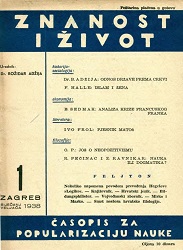
Analiza krize francuskog franka
Extract from the issue 1/1938 of the journal Znanost i život
More...We kindly inform you that, as long as the subject affiliation of our 300.000+ articles is in progress, you might get unsufficient or no results on your third level or second level search. In this case, please broaden your search criteria.

Extract from the issue 1/1938 of the journal Znanost i život
More...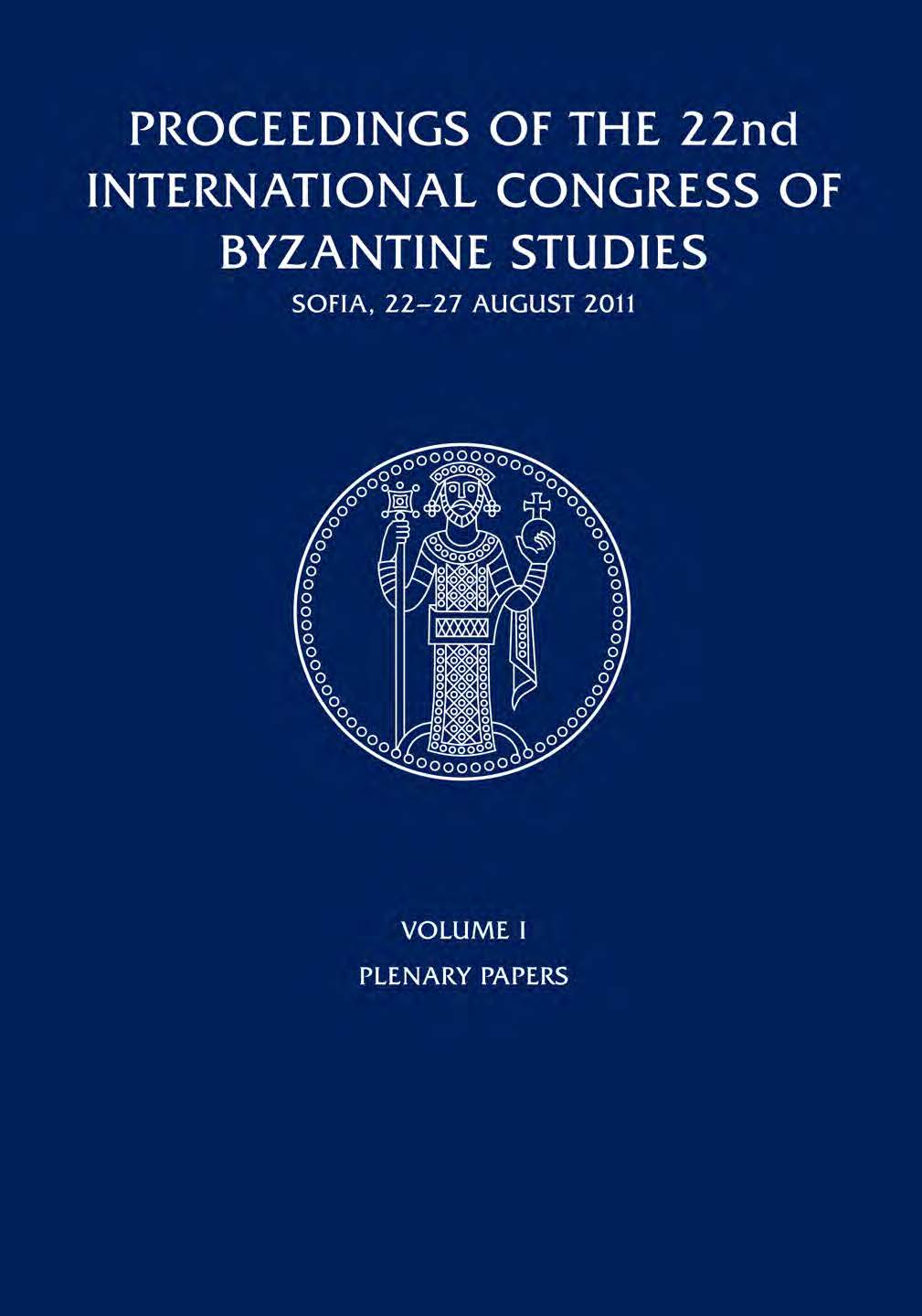


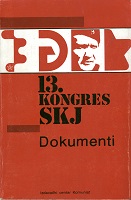
U borbi za razvijanje socijalističkih samoupravnih društvenih odnosa u procesu stvaranja društva slobodnog rada, ukidanja ostataka klasnog društva i svih oblika potčinjavanja i otuđenosti čovjeka, SKJ se, u razdoblju između 12. i 13. kongresa, suočio u mnogo čemu s novom društvenom situacijom i novim izazovima, nastalim prije svega ekonomskom krizom i proturječnostima društvenog razvoja što ih ona nosi. Rezultati postignuti u prevladavanju proturječnosti u materijalnoj osnovi i strukturi društva, u svijesti radnih ljudi i njihovih organiziranih socijalističkih snaga - pa i u SK, iako nedovoljni, pokazuju da imamo dovoljno snage, znanja i iskustva da brže unapređujemo samoupravljanje. Tražeći pouzdane odgovore za svladavanje nagomilanih teškoća izraženih u ekonomskoj krizi s ozbiljnim socijalnim, idejnim i političkim posljedicama, došli smo do dubljih spoznaja o zakonitostima i proturječnostima samoupravnog razvoja, o snagama koje ga nose, o interesima što ih one zastupaju. Na toj osnovi rješavali smo i riješili mnoge probleme.
More...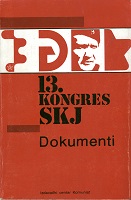
Ostvarivanje trajnih zajedničkih ciljeva i interesa društvenog i ekonomskog razvoja naše zemlje, svladavanje golemih teškoća u razvoju i izlazak iz ekonomske krize, daljnja izgradnja i jačanje socijalističkog samoupravljanja, dinamičan i skladniji društveno-ekonomski razvoj, brže uključivanje u međunarodnu podjelu rada, učvršćivanje ekonomskog jedinstva zemlje i stalno unapređivanje uvjeta života i rada radničke klase, radnih ljudi i građana zahtijevaju odgovarajuće promjene u sistemu društveno-ekonomskih i političkih odnosa i razvojnoj i ekonomskoj politici i djelovanju Saveza komunista i svih drugih subjektivnih samoupravnih socijalističkih snaga.
More...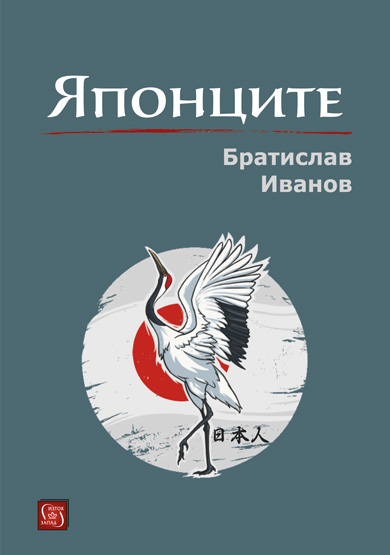
Bratislav Ivanov's new book is dedicated to the values and traditions of the Japanese culture. Already in the early twentieth century, French scientist Henry Dumolard draws attention to the fact that the Japanese people are guided by their logic and draw conclusions that are often incomprehensible to Europeans. To understand the Japanese people, we need to know the values that form the core of their culture. A key to their understanding is the geographical environment, mythology, religion, and Japan's history.
More...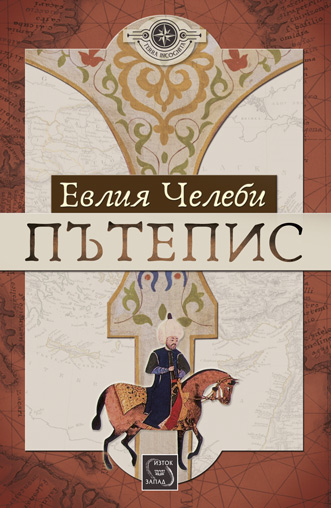
Evliya Celebi was an enlightened man in a variety of ways who believed in equality, freedom of thought and intellectual debate, and found all of these things present in Islamic societies. Over the course of his travels, he wrote ten volumes detailing his adventures. ‘Seyahatname’ – Book of Travels – is a unique and important text, representing one of the few accounts of the 17th century and the Ottoman world from the perspective of a Muslim. These are not just factual accounts, Evliya had a great imagination and just as important as his journal entries were the imaginative storytelling that ran alongside, elaborating, exaggerating, and fantasizing. Through his stories, we are prompted to think more imaginatively about our own travels and journeys to other cities. This 17th-century Muslim traveler can sometimes seem narrow-minded and yet this same man can stand in St Stephens Cathedral in Vienna and be moved by the music he hears. Sometimes these encounters lead to nothing but sometimes they lead to stories which are so deeply felt, and so universally melodic that they leave echoes which can still be heard and felt today. In 2011, the year which would have been his 400th birthday, Evliya is being paid homage as UNESCO’s Man of the Year.
More...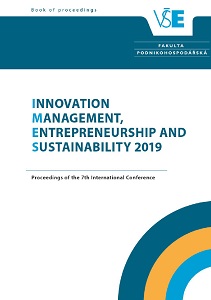
The 7th International Conference Innovation Management, Entrepreneurship and Sustainability (IMES 2019) took place on May 30 – 31, 2019 at the University of Economics, Prague. The conference was organised by the Department of Entrepreneurship of the University of Economics, Prague, Czech Republic in cooperation with other partners.Sound keynote speakers – Martina Musteen (San Diego State University, USA), Ilan Alon (University of Agder, Norway), Andrew Burke (Trinity Business School, Ireland), Arnim Wiek (Arizona State University, USA), Søren Salomo (Technical University Berlin, Germany) and Roy Thurik (Erasmus University Rotterdam, Netherlands) discussed the trends in the fields of innovation management, entrepreneurship and sustainability. The conference aimed to achieve academic excellence in a regional context and to establish a platform for mutual collaboration, exchange and dissemination of ideas among researchers and professionals.These conference proceedings contain contributions of the conference participants presented during both days of the conference. Authors of papers come from 22 countries all over the world, namely from Belgium, Bosnia and Herzegovina, Brazil, Bulgaria, Colombia, Croatia, Czech Republic, Finland, France, Germany, Hungary, India, Mexico, Paraguay, Poland, Portugal, Russian Federation, Slovakia, Sweden, Switzerland, USA and Vietnam. All these contributions have successfully passed the doubleblind peer-review process.
More...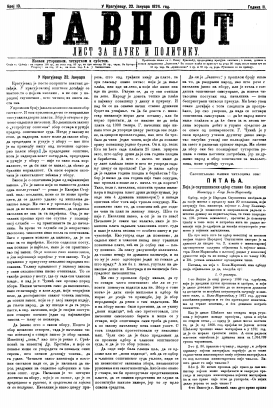
У Крагујевцу 22. Јануара; ПИТАЊА; Како се подиже пољоделство; Са велике школе; ДОПИСИ; Београд, 18. Јануар; У Књажевцу, 11. 1874. год.; Копривница, 15. Јануара; Јавна благодарност; Јавна коресподенција; Књижевни Огласи; ОГЛАСИ;
More...
Крагујевац 10. Фебруара; Са велике школе; Из записника Небојше; Народној скупштини: Штудије о стању пољске привреде у Србији; Предлог за нов грађански поступак у округу (кантону) циришком; Спољна политика немачка; ДОПИСИ; Крагујевачка новост; Мојим ђацима у крагујевачкој гимназији; Књижевна вест; ОГЛАСИ; ФАБРИКА ШЕШИРА КОД ЗЛАТНОГ ЧИЛИНДЕРА на бившој Стамбол-капији;
More...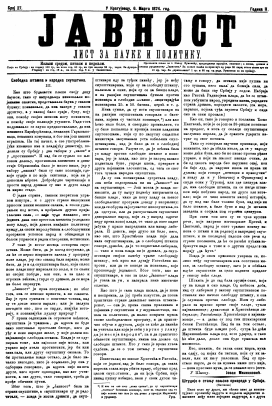
Слободна штампа и народна скупштина; Штудије о стању пољске привреде у Србији; ДОПИСИ; Јевропска дипломација и афера босанска; Београд 27. Фебруара; Баградан 15. Фебруара; РАЗЛИЧНОСТИ; ОГЛАСИ; На знање;
More...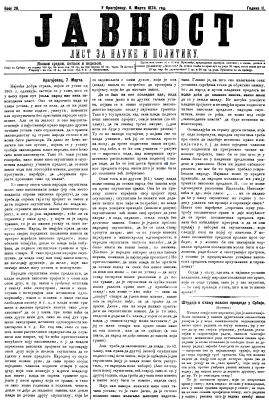
Крагујевац, 7. Марта; Штудије о стању пољске привреде у Србији; Најновији научни предлог; ДОПИСИ; Јевропска дипломација и афера босанска; РАЗЛИЧНОСТИ; Уредништву ''Јавности''; ПРИПОСЛАНО; ОГЛАСИ; На знање;
More...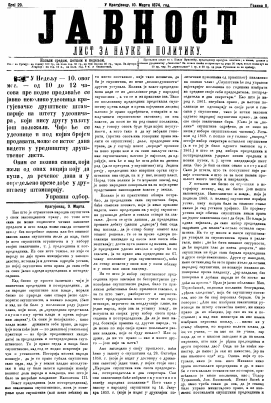
Штудије о стању пољске привреде у Србији; Земљедерско-шумарска школа у Пожаревцу; ДОПИСИ; Београд 28. Фебурара; Јагодина 6. Марта; Пожаревац 24. Фебурара; РАЗЛИЧНОСТИ; ОГЛАСИ; На знање;
More...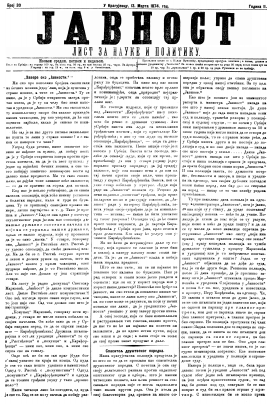
''Завере око ''Јавности'' ''; Спаситељ друштвеног поретка; Штудије о стању пољске привреде у Србији; Земљеделско-шумарска школа у Пожаревцу; ДОПИСИ; Опет спаситељ друштвеног поретка; Јавна благодарност; Ценовник; Књижевни Оглас; ОГЛАСИ;
More...
Ove nedelje obeleženo je 66 godina od početka proizvodnje legendarnog fiće, zvaničnog naziva Fiat 600, koja je u pogonu Stara prikolica nekadašnjeg Vojnotehničkog zavoda u Kragujevcu (nakon 2. svetskog rata preimenovanog u Zavode Crvena zastava) startovala 18. oktobra daleke 1955. Prethodno je, 1954. kupljena licenca od Fijata, čemu je 1953. prethodilo izjašnjavanje radnika kragujevačkih Zavoda o početku proizvodnje putničkih vozila u Kragujevcu.
More...
Prikaz knjige E.P. Thompsona „Pruga. Avantura izgradnje“ iz 1948, u prevodu Slobodanke Glišić, koja sadrži svedočenja članova britanske radne brigade koja je gradila prugu Šamac-Sarajevo. Tekst je objavljen u zborniku radova o ovoj knjizi, pod naslovom „Duh pruge“. Knjigu i zbornik je u jednim koricama 2020. objavila Fabrika knjiga.
More...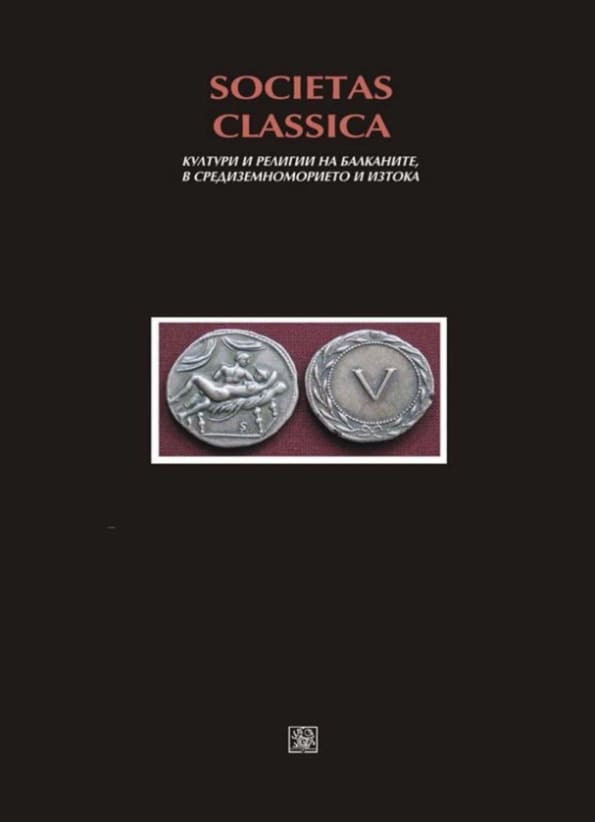
𝑆𝑜𝑐𝑖𝑒𝑡𝑎𝑠 𝐶𝑙𝑎𝑠𝑠𝑖𝑐𝑎 is a multilingual collection of papers presented at the international scientific conference that has been organized by the Department of Classical and Eastern Languages and Cultures of St. Cyril and St. Methodius University of Veliko Tarnovo (Bulgaria) since 2002. Until 2015, the conference was held annually. Since 2018, it is held once every two years. St Cyril and St Methodius University Press issues the collection within the Dr. Nicola Piccolo series. The wide range of topics and the opportunity for authors to submit their academic publications in the original language attracts researchers from all over the world.
More...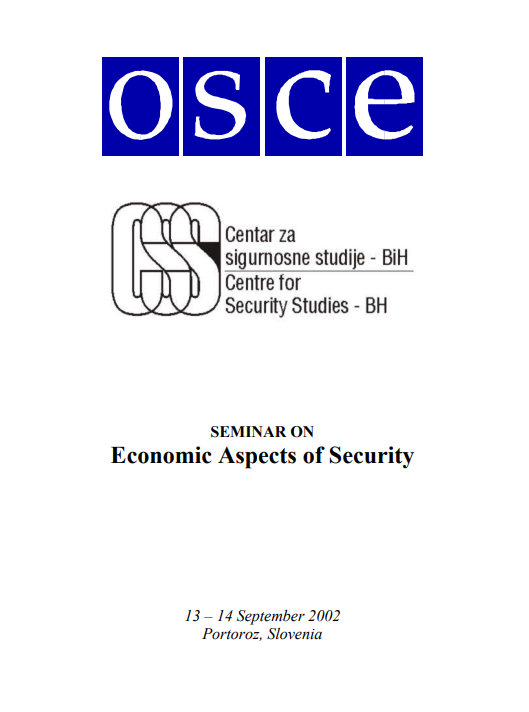
His Excellency Mr. Golob, Distinguished Ambassadors, Ladies and Gentlemen, it is with great pleasure that I welcome you to this seminar in Portoroz, Slovenia. Before proceeding, I wish to thank the Government of Slovenia for graciously allowing us to hold our seminar in beautiful Portoroz. Why this seminar? Why this topic? And. Why now? Perhaps those questions have crossed your mind as you received your invitation to participate in this seminar. “Why this seminar”. To answer this question I will briefly recall some events over the past few years that have led us to Portoroz today. The Agreement for Confidence – and Security Building Measures in Bosnia and Herzegovina (Article II, Annex 1b, Dayton Peace Accords) contains one particular provision for “voluntary measures”. Under the auspices of this provision we have, over the past few years, conducted numerous seminars on topics such as “Democratic Control of the Armed Forces”, “Military Support to Civilians in Cases of Man-Made or Natural Disaster”. In particular, the seminar on Democratic Control spawned a whole series of initiatives involving NATO and OHR, as well as a number of bilateral initiatives, most notably with Switzerland and Sweden which focussed on members of the BiH government and senior military officials. In tandem with these initiatives, my office, with the gracious help of a number of OSCE countries, has sponsored Code of Conduct seminars targeting junior and mid-level officers. These seminars are an introduction into the OSCE as a body and the Code of Conduct measures adopted by the OSCE. In addition to these efforts, and still under the auspices of the Article II Agreement, the members of the Joint Consultative Commission, the body that oversees implementation of the Agreement on Confidence – and Security-Building Measures in Bosnia and Herzegovina agreed that in the interest of greater confidence and transparency they would allow a team of international auditors to conduct an audit of their respective military budgets. The aim, of course, was to show that the budgets could no longer sustain the relatively large military forces maintained in Republika Srpska and the Federation of Bosnia and Herzegovina. This audit process was hugely successful and evolved into a mammoth initiative that was given to Ambassador Beecroft and his staff. Arguably, it was this initial audit decision that has subsequently led to the tremendous restructuring and demobilization process that is on-going. This is of course a painful process but a necessary one that will lead to a military structure more compatible with actual defense and security needs and will move Bosnia and Herzegovina one step closer to European integration.
More...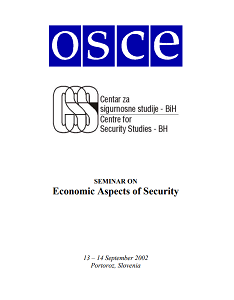
His Excellency Mr. Golob, Distinguished Ambassadors, Ladies and Gentlemen, it is with great pleasure that I welcome you to this seminar in Portoroz, Slovenia. Before proceeding, I wish to thank the Government of Slovenia for graciously allowing us to hold our seminar in beautiful Portoroz. Why this seminar? Why this topic? And. Why now? Perhaps those questions have crossed your mind as you received your invitation to participate in this seminar. “Why this seminar”. To answer this question I will briefly recall some events over the past few years that have led us to Portoroz today. The Agreement for Confidence – and Security Building Measures in Bosnia and Herzegovina (Article II, Annex 1b, Dayton Peace Accords) contains one particular provision for “voluntary measures”. Under the auspices of this provision we have, over the past few years, conducted numerous seminars on topics such as “Democratic Control of the Armed Forces”, “Military Support to Civilians in Cases of Man-Made or Natural Disaster”. In particular, the seminar on Democratic Control spawned a whole series of initiatives involving NATO and OHR, as well as a number of bilateral initiatives, most notably with Switzerland and Sweden which focussed on members of the BiH government and senior military officials. In tandem with these initiatives, my office, with the gracious help of a number of OSCE countries, has sponsored Code of Conduct seminars targeting junior and mid-level officers. These seminars are an introduction into the OSCE as a body and the Code of Conduct measures adopted by the OSCE.
More...